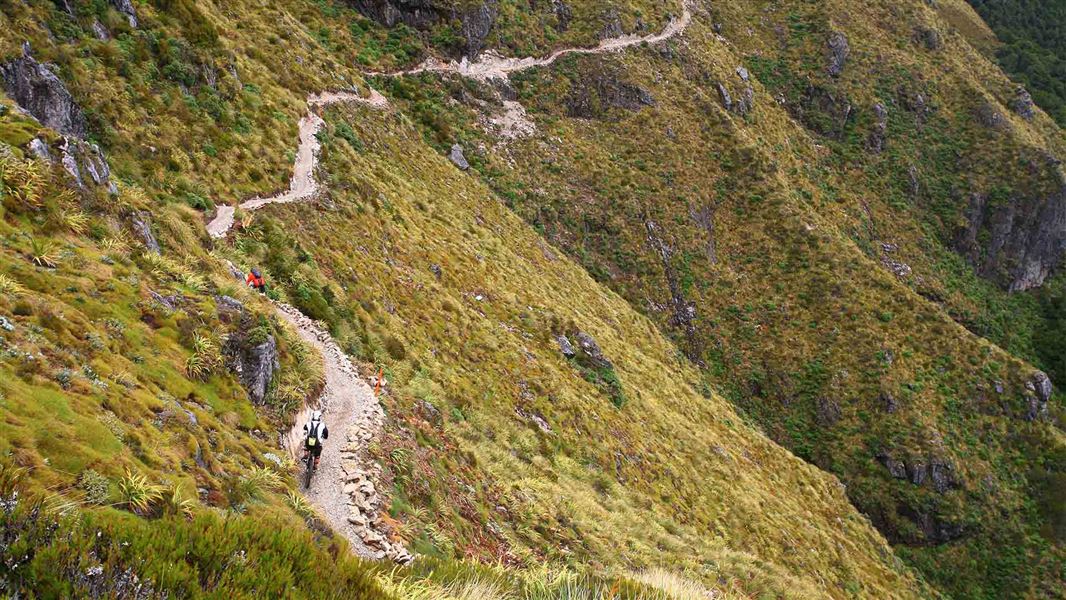Why changes are needed
The Department of Conservation (DOC) hasn’t been able to consider new biking proposals on public conservation land efficiently. Where a location was not listed in the Conservation Management Strategy (CMS), we have been unable to consider new biking proposals without a CMS partial review or amendment.
This has been based on the understanding that the Conservation General Policy (CGP) requires bike track locations to be listed in each CMS, before any proposal can be considered and approved.
This approach has proven inflexible, and frustrating to both DOC and bike trail makers.
In 2023, we shared a draft approach to address this issue through partial reviews of CMS. We proposed to add policies with robust assessment criteria for new biking proposals. We also proposed to include bike-free areas where new bike tracks wouldn’t be considered.
Stakeholders asked us to consider alternatives. In September 2023, we paused the project while we explored different policy approaches.
What is a CMS?
CMS are statutory documents that cover public conservation land and waters for a region and explain how natural and cultural heritage resources, recreation and other activities will be managed. They must be consistent with the Conservation General Policy (CGP).
The CGP provides national guidance for management of public conservation land and waters. We have interpreted and implemented CGP by listing in CMS where bikes could be used.
Retesting our understanding of the CGP has enabled a more flexible approach
Recent re-examination of the CGP requirements has resulted in a more flexible understanding of how we ‘identify’ where biking is able to occur in CMS. (See our most recent project update: June 2024 (PDF, 765K)).
In future CMS, we will be able to identify where biking opportunities are allowed in ways other than listing tracks or locations. For example, through criteria or zones. This means we won’t have to list locations and we can take a more flexible policy approach.
National parks are not included in the flexible approach
National parks make up around one-third of all public conservation land. They are managed under specific legislation and general policy – the National Parks Act 1980 and General Policy for National Parks 2005. The new approach won’t be applied to biking in national parks. We will consider how we manage bikes when we review each national park management plan. This will include public consultation.
What this means for current CMS
Ten of 16 CMS are now considered to have flexibility that will enable DOC to consider new biking proposals on locations not listed in a CMS, without requiring a CMS amendment or review.
| CMS likely to have flexibility | CMS unlikely to have flexibility |
| Northland | Auckland |
| Bay of Plenty | Waikato |
| East Coast | Canterbury (Waitaha) |
| Hawke’s Bay | Otago |
| Tongariro-Taupo | Southland Murihiku |
| Wanganui | Stewart Island/Rakiura |
| Wellington | |
| Nelson/Marlborough | |
| West Coast Te Tai o Poutini | |
| Chatham Islands |
The biking policies in the 6 CMS with little flexibility are written so that only tracks or locations listed in CMS can be considered for biking.
What does this mean for the consideration of new bike tracks?
In most regions, we will be able to process new biking proposals more efficiently.
Conservation values, and the potential effects of new biking proposals, will still be central to decision making. Any new proposal will still need to meet the requirements of legislation, the CGP and any other relevant CMS policies. This is the same as any other type of track or recreational activity.
We will create guidance for our teams to support the assessment of new bike tracks.
How will we address the remaining CMS?
Amending or reviewing the remaining six CMS would enable these regions to benefit from this more flexible approach by enabling consideration of new biking proposals on their merits.
We are looking at how this could fit into our workplan, noting it will be need to be weighed against other DOC priorities, including addressing the backlog of CMS that need a full review.
Previous public engagement
In 2022 and 2023, we consulted with Conservation Boards on our original proposed approach.
Our generic presentation is available to view. This was tailored for each conservation board to reflect the regional context.
We also set up workshops for people with an interest in how biking is managed. You can find the presentations along with some key discussion topics here:
- Workshop 1: Context and Purpose: Presentation (PDF, 815K)
- Workshop 1: Context and Purpose: Discussion Topics (PDF, 874K)
- Workshop 2: Bike-free areas: Presentation (PDF, 940K)
- Workshop 2 Bike-free areas: Discussion Topics (PDF, 915K)
We continue to keep Conservation Boards, NZCA and other stakeholders up to date. You can find project updates below. We have also briefed the Minister of Conservation on the issue.
Our next steps
- Continue to look at broader issue, including considering options for remaining CMS. We will establish timeframes and communicate them.
- Prepare guidance for staff to support assessment of new bike tracks.
- Determine position on existing bike tracks that may still be inconsistent with CMS.
Read more on project updates
- June 2024 (PDF, 765K)
- December 2023 (PDF, 638K)
- July 2023 (PDF, 792K)
- March 2023 (PDF, 310K)
- September 2022 (PDF, 439K)
Contact
If you have any questions email us.
